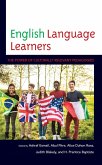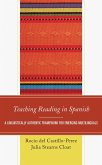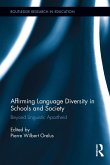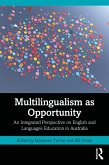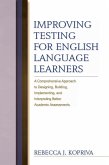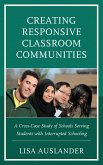Ashraf Esmail, Abul Pitre, Alice Duhon Ross, Judith Blakely, H. Prentice Baptiste
English Language Learners (eBook, PDF)
The Power of Culturally Relevant Pedagogies
18,95 €
18,95 €
inkl. MwSt.
Sofort per Download lieferbar

9 °P sammeln
18,95 €
Als Download kaufen

18,95 €
inkl. MwSt.
Sofort per Download lieferbar

9 °P sammeln
Jetzt verschenken
Alle Infos zum eBook verschenken
18,95 €
inkl. MwSt.
Sofort per Download lieferbar
Alle Infos zum eBook verschenken

9 °P sammeln
Ashraf Esmail, Abul Pitre, Alice Duhon Ross, Judith Blakely, H. Prentice Baptiste
English Language Learners (eBook, PDF)
The Power of Culturally Relevant Pedagogies
- Format: PDF
- Merkliste
- Auf die Merkliste
- Bewerten Bewerten
- Teilen
- Produkt teilen
- Produkterinnerung
- Produkterinnerung

Bitte loggen Sie sich zunächst in Ihr Kundenkonto ein oder registrieren Sie sich bei
bücher.de, um das eBook-Abo tolino select nutzen zu können.
Hier können Sie sich einloggen
Hier können Sie sich einloggen
Sie sind bereits eingeloggt. Klicken Sie auf 2. tolino select Abo, um fortzufahren.

Bitte loggen Sie sich zunächst in Ihr Kundenkonto ein oder registrieren Sie sich bei bücher.de, um das eBook-Abo tolino select nutzen zu können.
The recent increase in immigration patterns in the United States has meant an increase in the number of children entering American schools whose first language is not English. Some reports indicate that as many as one in four students come from families where the language spoken in the home is not English. English Language Learners: The Power of Culturally Relevant Pedagogies provides teachers access to information that will help them understand the English language learner, develop effective strategies to teach English language learners, create effective learning environments, and use…mehr
- Geräte: PC
- ohne Kopierschutz
- eBook Hilfe
Andere Kunden interessierten sich auch für
![English Language Learners (eBook, ePUB) English Language Learners (eBook, ePUB)]() Ashraf EsmailEnglish Language Learners (eBook, ePUB)18,95 €
Ashraf EsmailEnglish Language Learners (eBook, ePUB)18,95 €![Teaching Reading in Spanish (eBook, PDF) Teaching Reading in Spanish (eBook, PDF)]() Rocio del Castillo-PerezTeaching Reading in Spanish (eBook, PDF)22,95 €
Rocio del Castillo-PerezTeaching Reading in Spanish (eBook, PDF)22,95 €![Social Justice Perspectives on English Language Learners (eBook, PDF) Social Justice Perspectives on English Language Learners (eBook, PDF)]() Social Justice Perspectives on English Language Learners (eBook, PDF)49,95 €
Social Justice Perspectives on English Language Learners (eBook, PDF)49,95 €![Affirming Language Diversity in Schools and Society (eBook, PDF) Affirming Language Diversity in Schools and Society (eBook, PDF)]() Affirming Language Diversity in Schools and Society (eBook, PDF)39,95 €
Affirming Language Diversity in Schools and Society (eBook, PDF)39,95 €![Multilingualism as Opportunity (eBook, PDF) Multilingualism as Opportunity (eBook, PDF)]() Multilingualism as Opportunity (eBook, PDF)42,95 €
Multilingualism as Opportunity (eBook, PDF)42,95 €![Improving Testing For English Language Learners (eBook, PDF) Improving Testing For English Language Learners (eBook, PDF)]() Rebecca KoprivaImproving Testing For English Language Learners (eBook, PDF)54,95 €
Rebecca KoprivaImproving Testing For English Language Learners (eBook, PDF)54,95 €![Creating Responsive Classroom Communities (eBook, PDF) Creating Responsive Classroom Communities (eBook, PDF)]() Lisa AuslanderCreating Responsive Classroom Communities (eBook, PDF)27,95 €
Lisa AuslanderCreating Responsive Classroom Communities (eBook, PDF)27,95 €-
-
-
The recent increase in immigration patterns in the United States has meant an increase in the number of children entering American schools whose first language is not English. Some reports indicate that as many as one in four students come from families where the language spoken in the home is not English. English Language Learners: The Power of Culturally Relevant Pedagogies provides teachers access to information that will help them understand the English language learner, develop effective strategies to teach English language learners, create effective learning environments, and use assessments to meet the needs of English language learners as well as garner community resources to support English language learners.
Produktdetails
- Produktdetails
- Verlag: Bloomsbury eBooks US
- Seitenzahl: 164
- Erscheinungstermin: 8. März 2023
- Englisch
- ISBN-13: 9798765168448
- Artikelnr.: 74845716
- Verlag: Bloomsbury eBooks US
- Seitenzahl: 164
- Erscheinungstermin: 8. März 2023
- Englisch
- ISBN-13: 9798765168448
- Artikelnr.: 74845716
- Herstellerkennzeichnung Die Herstellerinformationen sind derzeit nicht verfügbar.
Dr. Ashraf Esmail is associate professor and program coordinator of criminal justice at Dillard University. He is the Director for the Center for Racial Justice and Barron Hilton Criminal Justice Endowed Professor.
Dr. Abul Pitre is professor and department chair of Africana Studies at San Francisco State University. He was appointed Edinboro University's first named professor for his outstanding work in African American education and held the distinguished title of Carter G. Woodson Professor of Education.
Dr. Alice Duhon Ross is a core faculty for the Richard W. Riley College of Education at Walden University. Current research focus is multicultural, international, peace education. She is a career educator with over thirty years of teaching in higher education and is Nationally Board-Certified Counselor and National Board-Certified School Counselor.
Dr. Judith Blakely is academic coordinator at Walden University and serves a vital role in maximizing student achievement by incorporating leadership, advocacy, and collaboration. She is certified in multiple states as a school superintendent, school administrator (pre-K-12 principal), and Director of Special, Bilingual, and Gifted Education.
Dr. H. Prentice Baptiste is a Regents and Distinguished Achievement Professor, and in 2014 was awarded the first College of Education, Diversity Award at New Mexico State University. He was president of the National Association for Multicultural Education (NAME), a premier organization advocating for equity and social justice, which he helped found in 1990.
Dr. Abul Pitre is professor and department chair of Africana Studies at San Francisco State University. He was appointed Edinboro University's first named professor for his outstanding work in African American education and held the distinguished title of Carter G. Woodson Professor of Education.
Dr. Alice Duhon Ross is a core faculty for the Richard W. Riley College of Education at Walden University. Current research focus is multicultural, international, peace education. She is a career educator with over thirty years of teaching in higher education and is Nationally Board-Certified Counselor and National Board-Certified School Counselor.
Dr. Judith Blakely is academic coordinator at Walden University and serves a vital role in maximizing student achievement by incorporating leadership, advocacy, and collaboration. She is certified in multiple states as a school superintendent, school administrator (pre-K-12 principal), and Director of Special, Bilingual, and Gifted Education.
Dr. H. Prentice Baptiste is a Regents and Distinguished Achievement Professor, and in 2014 was awarded the first College of Education, Diversity Award at New Mexico State University. He was president of the National Association for Multicultural Education (NAME), a premier organization advocating for equity and social justice, which he helped found in 1990.
Acknowledgments
Introduction
Jancarlos J. Wagner-Romero
Chapter 1. Providing Effective Learning Environments for English Learners
through Practicing Care Theory and Understanding Identities
SoYoung Kang
Chapter 2. Moving Toward Coherent and Collaborative Coaching for
Linguistically Responsive Teaching
Monica S. Yoo, Leslie Grant, Lisa Fetman, and Veronica Garza
Chapter 3. Working with Undocumented Immigrant Students: Developing and
Sustaining Longstanding Relationships
James Cohen, Magdalena Haro, Sarah Heinz, and Thalia Marron
Chapter 4. Assessing the English Language Learner
Amy Van Buren
Chapter 5. Transforming Pre-Service Teacher Education: Culturally
Responsive Teaching through Multicultural Children's Literature as a
Vehicle of Social Change for English Language Learners
Sunyung Song
Chapter 6. Recognizing Embodied Histories and Intersectionality of Students
of Color in Language Teaching
Brianna R. Ramirez and Ruby Osoria
Chapter 7. The Future Is Multilingual: Chicanafuturism as Curriculum for
English Language Learners
Jim L. Hollar and Jesslyn R. Hollar
Chapter 8. A Critical Multicultural Analysis of English Learners in
Picturebooks
Amina Chaudhri
Chapter 9. Assessment of English Learners: Adopting a Cultural Validity
Assessment Framework
Eric J. López and Esther Garza
Chapter 10. Grade Level Placement of English Language Learners: Legal and
Ethical Considerations
Mariola Krol
Chapter 11. Characteristics of English Learners
Daniela DiGregorio
Chapter 12. Fluidity of Diversity: Reshaping How Educators Understand
English Language Learners' Needs in the Classroom
Dorota Silber-Furman and Andrea Arce-Trigatti
Chapter 13. Serving English Language Learners with Exceptional and Diverse
Needs
Srimani Chakravarthi
Chapter 14. Effective Learning Environments for English Learners
Abbey Bachmann
Chapter 15. Culturally Responsive Social-Emotional Learning for ELL
Students with Limited or Interrupted Formal Education
Jessica Furrer and Sara Castro-Olivo
About the Editors
About the Contributors
Introduction
Jancarlos J. Wagner-Romero
Chapter 1. Providing Effective Learning Environments for English Learners
through Practicing Care Theory and Understanding Identities
SoYoung Kang
Chapter 2. Moving Toward Coherent and Collaborative Coaching for
Linguistically Responsive Teaching
Monica S. Yoo, Leslie Grant, Lisa Fetman, and Veronica Garza
Chapter 3. Working with Undocumented Immigrant Students: Developing and
Sustaining Longstanding Relationships
James Cohen, Magdalena Haro, Sarah Heinz, and Thalia Marron
Chapter 4. Assessing the English Language Learner
Amy Van Buren
Chapter 5. Transforming Pre-Service Teacher Education: Culturally
Responsive Teaching through Multicultural Children's Literature as a
Vehicle of Social Change for English Language Learners
Sunyung Song
Chapter 6. Recognizing Embodied Histories and Intersectionality of Students
of Color in Language Teaching
Brianna R. Ramirez and Ruby Osoria
Chapter 7. The Future Is Multilingual: Chicanafuturism as Curriculum for
English Language Learners
Jim L. Hollar and Jesslyn R. Hollar
Chapter 8. A Critical Multicultural Analysis of English Learners in
Picturebooks
Amina Chaudhri
Chapter 9. Assessment of English Learners: Adopting a Cultural Validity
Assessment Framework
Eric J. López and Esther Garza
Chapter 10. Grade Level Placement of English Language Learners: Legal and
Ethical Considerations
Mariola Krol
Chapter 11. Characteristics of English Learners
Daniela DiGregorio
Chapter 12. Fluidity of Diversity: Reshaping How Educators Understand
English Language Learners' Needs in the Classroom
Dorota Silber-Furman and Andrea Arce-Trigatti
Chapter 13. Serving English Language Learners with Exceptional and Diverse
Needs
Srimani Chakravarthi
Chapter 14. Effective Learning Environments for English Learners
Abbey Bachmann
Chapter 15. Culturally Responsive Social-Emotional Learning for ELL
Students with Limited or Interrupted Formal Education
Jessica Furrer and Sara Castro-Olivo
About the Editors
About the Contributors
Acknowledgments
Introduction
Jancarlos J. Wagner-Romero
Chapter 1. Providing Effective Learning Environments for English Learners
through Practicing Care Theory and Understanding Identities
SoYoung Kang
Chapter 2. Moving Toward Coherent and Collaborative Coaching for
Linguistically Responsive Teaching
Monica S. Yoo, Leslie Grant, Lisa Fetman, and Veronica Garza
Chapter 3. Working with Undocumented Immigrant Students: Developing and
Sustaining Longstanding Relationships
James Cohen, Magdalena Haro, Sarah Heinz, and Thalia Marron
Chapter 4. Assessing the English Language Learner
Amy Van Buren
Chapter 5. Transforming Pre-Service Teacher Education: Culturally
Responsive Teaching through Multicultural Children's Literature as a
Vehicle of Social Change for English Language Learners
Sunyung Song
Chapter 6. Recognizing Embodied Histories and Intersectionality of Students
of Color in Language Teaching
Brianna R. Ramirez and Ruby Osoria
Chapter 7. The Future Is Multilingual: Chicanafuturism as Curriculum for
English Language Learners
Jim L. Hollar and Jesslyn R. Hollar
Chapter 8. A Critical Multicultural Analysis of English Learners in
Picturebooks
Amina Chaudhri
Chapter 9. Assessment of English Learners: Adopting a Cultural Validity
Assessment Framework
Eric J. López and Esther Garza
Chapter 10. Grade Level Placement of English Language Learners: Legal and
Ethical Considerations
Mariola Krol
Chapter 11. Characteristics of English Learners
Daniela DiGregorio
Chapter 12. Fluidity of Diversity: Reshaping How Educators Understand
English Language Learners' Needs in the Classroom
Dorota Silber-Furman and Andrea Arce-Trigatti
Chapter 13. Serving English Language Learners with Exceptional and Diverse
Needs
Srimani Chakravarthi
Chapter 14. Effective Learning Environments for English Learners
Abbey Bachmann
Chapter 15. Culturally Responsive Social-Emotional Learning for ELL
Students with Limited or Interrupted Formal Education
Jessica Furrer and Sara Castro-Olivo
About the Editors
About the Contributors
Introduction
Jancarlos J. Wagner-Romero
Chapter 1. Providing Effective Learning Environments for English Learners
through Practicing Care Theory and Understanding Identities
SoYoung Kang
Chapter 2. Moving Toward Coherent and Collaborative Coaching for
Linguistically Responsive Teaching
Monica S. Yoo, Leslie Grant, Lisa Fetman, and Veronica Garza
Chapter 3. Working with Undocumented Immigrant Students: Developing and
Sustaining Longstanding Relationships
James Cohen, Magdalena Haro, Sarah Heinz, and Thalia Marron
Chapter 4. Assessing the English Language Learner
Amy Van Buren
Chapter 5. Transforming Pre-Service Teacher Education: Culturally
Responsive Teaching through Multicultural Children's Literature as a
Vehicle of Social Change for English Language Learners
Sunyung Song
Chapter 6. Recognizing Embodied Histories and Intersectionality of Students
of Color in Language Teaching
Brianna R. Ramirez and Ruby Osoria
Chapter 7. The Future Is Multilingual: Chicanafuturism as Curriculum for
English Language Learners
Jim L. Hollar and Jesslyn R. Hollar
Chapter 8. A Critical Multicultural Analysis of English Learners in
Picturebooks
Amina Chaudhri
Chapter 9. Assessment of English Learners: Adopting a Cultural Validity
Assessment Framework
Eric J. López and Esther Garza
Chapter 10. Grade Level Placement of English Language Learners: Legal and
Ethical Considerations
Mariola Krol
Chapter 11. Characteristics of English Learners
Daniela DiGregorio
Chapter 12. Fluidity of Diversity: Reshaping How Educators Understand
English Language Learners' Needs in the Classroom
Dorota Silber-Furman and Andrea Arce-Trigatti
Chapter 13. Serving English Language Learners with Exceptional and Diverse
Needs
Srimani Chakravarthi
Chapter 14. Effective Learning Environments for English Learners
Abbey Bachmann
Chapter 15. Culturally Responsive Social-Emotional Learning for ELL
Students with Limited or Interrupted Formal Education
Jessica Furrer and Sara Castro-Olivo
About the Editors
About the Contributors

